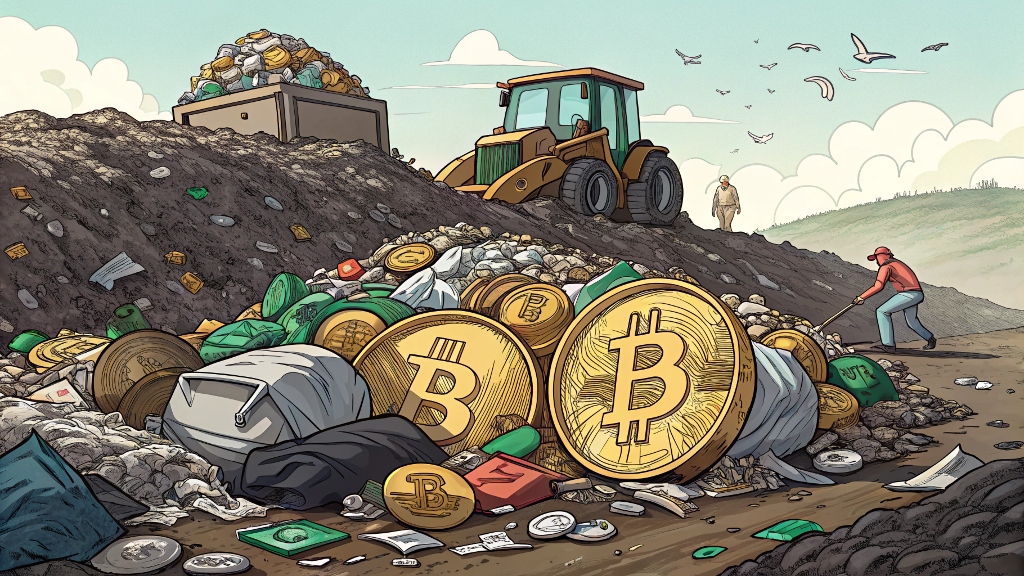
James Howells’ Last-Ditch Effort to Recover Lost Bitcoin Hard Drive From a Landfill
In the world of cryptocurrency, stories of lost fortunes are almost as legendary as tales of astronomical gains. Among these, few are as compelling as the saga of a Welsh man’s tireless pursuit to recover a hard drive containing thousands of bitcoins—now worth close to one billion US dollars—lost in a landfill over a decade ago. This ongoing quest has captured the imagination of crypto enthusiasts, treasure hunters, and the general public, highlighting both the promise and peril of digital assets.
The Origin of the Lost Bitcoin Fortune
The story begins in 2013, when James Howells, an IT worker from Newport, Wales, accidentally threw away a hard drive during a routine house clean-up. Unbeknownst to him at the time, this small piece of hardware contained the private keys to a digital wallet holding 8,000 bitcoins. Back then, the cryptocurrency was trading for a fraction of its current value, and the loss seemed unfortunate but not catastrophic.
As bitcoin’s price soared over the years, the value of the lost wallet skyrocketed, turning what was once a minor mistake into a life-altering misfortune. Today, those bitcoins are worth hundreds of millions, making the hard drive one of the most valuable lost items in history.
The Search Begins: Early Attempts and Setbacks
Howells’s realization of his mistake set off a series of increasingly ambitious attempts to recover the hard drive. His initial efforts involved contacting the Newport City Council and requesting permission to search the local landfill where he believed the device had ended up. However, the council cited environmental regulations, health and safety concerns, and the sheer scale of the landfill as reasons for denying access.
Undeterred, Howells continued to lobby local authorities, offering to fund the excavation and promising a share of the recovered fortune to the city. Despite media attention and public interest, official resistance remained firm, with concerns about the environmental impact and cost of such an operation taking precedence.
The Technology Behind the Search
The challenge of recovering a hard drive from a landfill is immense. Over the years, Howells has assembled a team of experts in excavation, data recovery, and environmental science. The proposed operation would use advanced technologies, including artificial intelligence and robotic sorting systems, to sift through thousands of tons of waste efficiently and safely.
- Drone Mapping: Drones equipped with high-resolution cameras would map the landfill, identifying the most likely locations for the hard drive.
- AI-Powered Sorting: Machine learning algorithms would analyze the composition of landfill layers, narrowing down the search area.
- Robotic Excavators: Specialized machinery would carefully dig through the waste, minimizing environmental disruption.
- Data Recovery Labs: If the hard drive is found, data recovery specialists would attempt to extract the wallet’s private keys, even if the device has suffered significant physical damage.
Environmental and Legal Hurdles
One of the primary obstacles to the search is the environmental risk posed by excavating a landfill. Local authorities have expressed concerns about the potential release of hazardous materials, disruption of wildlife habitats, and the cost of restoring the site afterward. There are also legal complexities regarding ownership of the recovered bitcoins and liability for any environmental damage.
Howells has pledged to adhere to strict environmental protocols and cover all associated costs, including site restoration and community benefits. He has also offered to donate a substantial portion of the recovered bitcoin to local charities and public projects, hoping to win public support and sway the council’s decision.
The Emotional Toll and Public Fascination
The story of the lost bitcoin hard drive has resonated with people around the world, becoming a symbol of both the volatility and potential of cryptocurrency. For Howells, the emotional toll has been significant. In interviews, he has spoken candidly about the stress, regret, and hope that have defined his life since the loss.
- Regret: The knowledge that a simple mistake cost him a life-changing sum is a heavy burden.
- Hope: Advances in technology and persistent advocacy keep the dream of recovery alive.
- Public Support: Many have rallied behind Howells, offering encouragement, technical advice, and even financial backing for the search.
The Economics of Lost Cryptocurrency
Howells’s predicament is not unique. It is estimated that millions of bitcoins—representing a significant portion of the total supply—are lost forever due to forgotten passwords, discarded hardware, or inaccessible wallets. This phenomenon has several implications for the cryptocurrency ecosystem:
- Scarcity: Lost coins reduce the effective supply of bitcoin, potentially increasing its value over time.
- Security: The irreversible nature of blockchain transactions means there is no recourse for lost or stolen funds.
- Innovation: Stories like Howells’s have spurred the development of better wallet backup solutions and recovery services.
The Latest Developments: Renewed Hope and New Proposals
In recent months, Howells has launched a last-ditch effort to persuade the Newport City Council to allow a carefully managed search. Backed by a consortium of venture capitalists and technology firms, he has presented a detailed plan addressing environmental, financial, and legal concerns.
Key elements of the proposal include:
- Full Funding: All costs covered by private investors, with no financial risk to the city.
- Environmental Safeguards: Comprehensive plans to minimize and remediate any environmental impact.
- Community Benefits: A share of the recovered bitcoin earmarked for local development projects.
- Transparency: Regular updates and oversight by independent observers.
The council has agreed to review the latest proposal, raising hopes that the search may finally proceed after years of deadlock.
The Broader Impact: Lessons for Crypto Investors
The saga of the lost bitcoin hard drive serves as a cautionary tale for anyone involved in digital assets. It underscores the importance of secure storage, regular backups, and careful management of private keys. As cryptocurrencies become more mainstream, user education and robust security practices are essential to prevent similar losses.
1. Always Back Up Your Wallet
- Store backups in multiple secure locations.
- Use both physical and digital backup methods.
- Test your backups periodically to ensure they work.
2. Understand the Risks of Self-Custody
- Self-custody gives you full control but also full responsibility.
- Consider using hardware wallets with recovery phrases.
- Explore custodial solutions if you are uncomfortable managing keys yourself.
3. Stay Informed About Recovery Options
- New recovery technologies and services are emerging.
- Some wallets now offer social recovery or multi-signature options.
- Stay updated on best practices from reputable sources.
The Human Side of the Crypto Revolution
Beyond the technical and financial aspects, the story of the lost bitcoin hard drive is a profoundly human one. It is about hope, perseverance, and the lengths to which people will go to reclaim what is theirs. It is also a reminder that, in the digital age, a single moment of carelessness can have lasting consequences.
As the world watches to see if Howells’s quest will finally bear fruit, his journey continues to inspire debate, innovation, and reflection within the cryptocurrency community. Whether the hard drive is ever recovered or remains buried beneath layers of waste, its story will endure as a testament to the unique challenges and opportunities of the crypto era.














